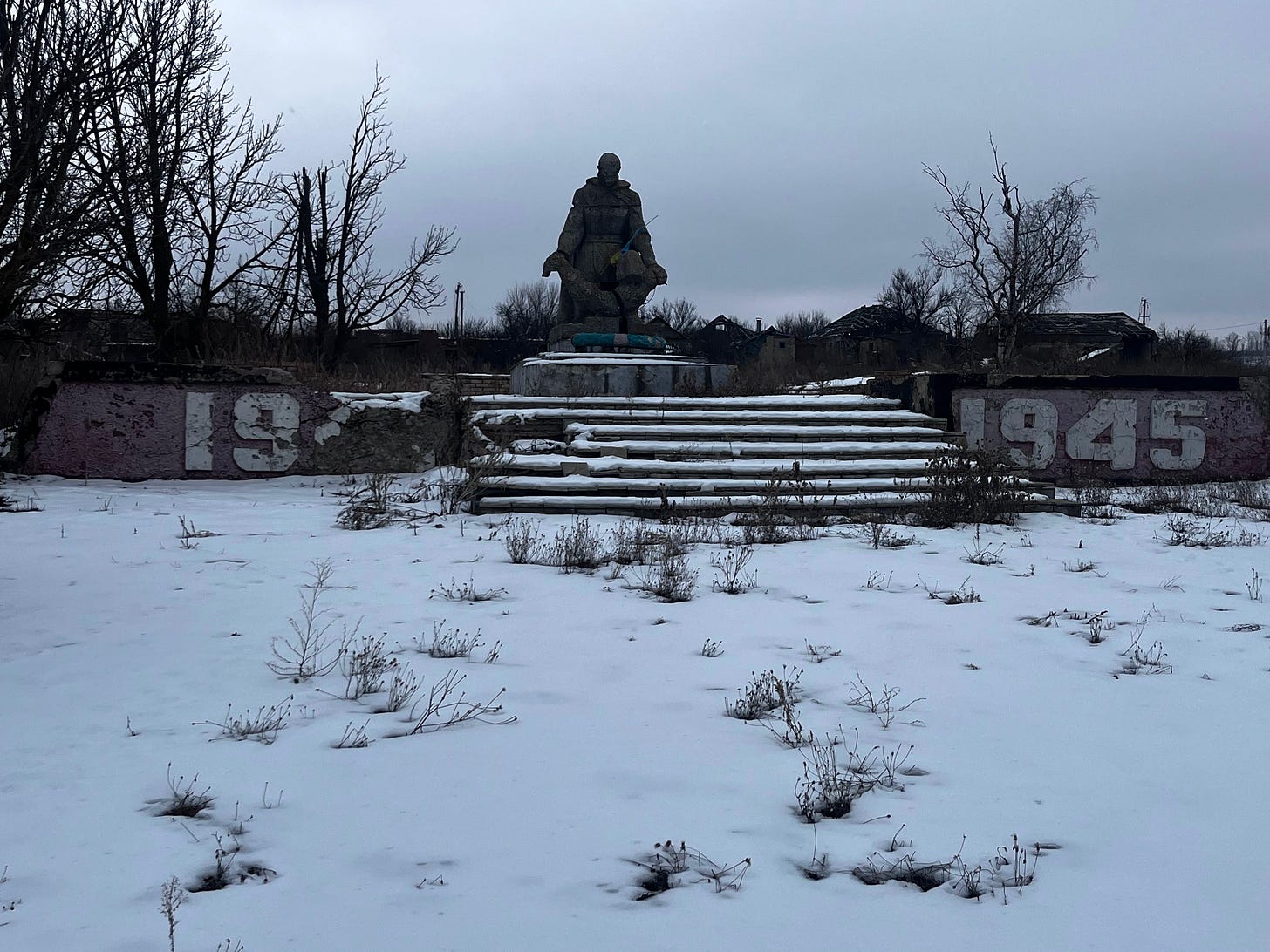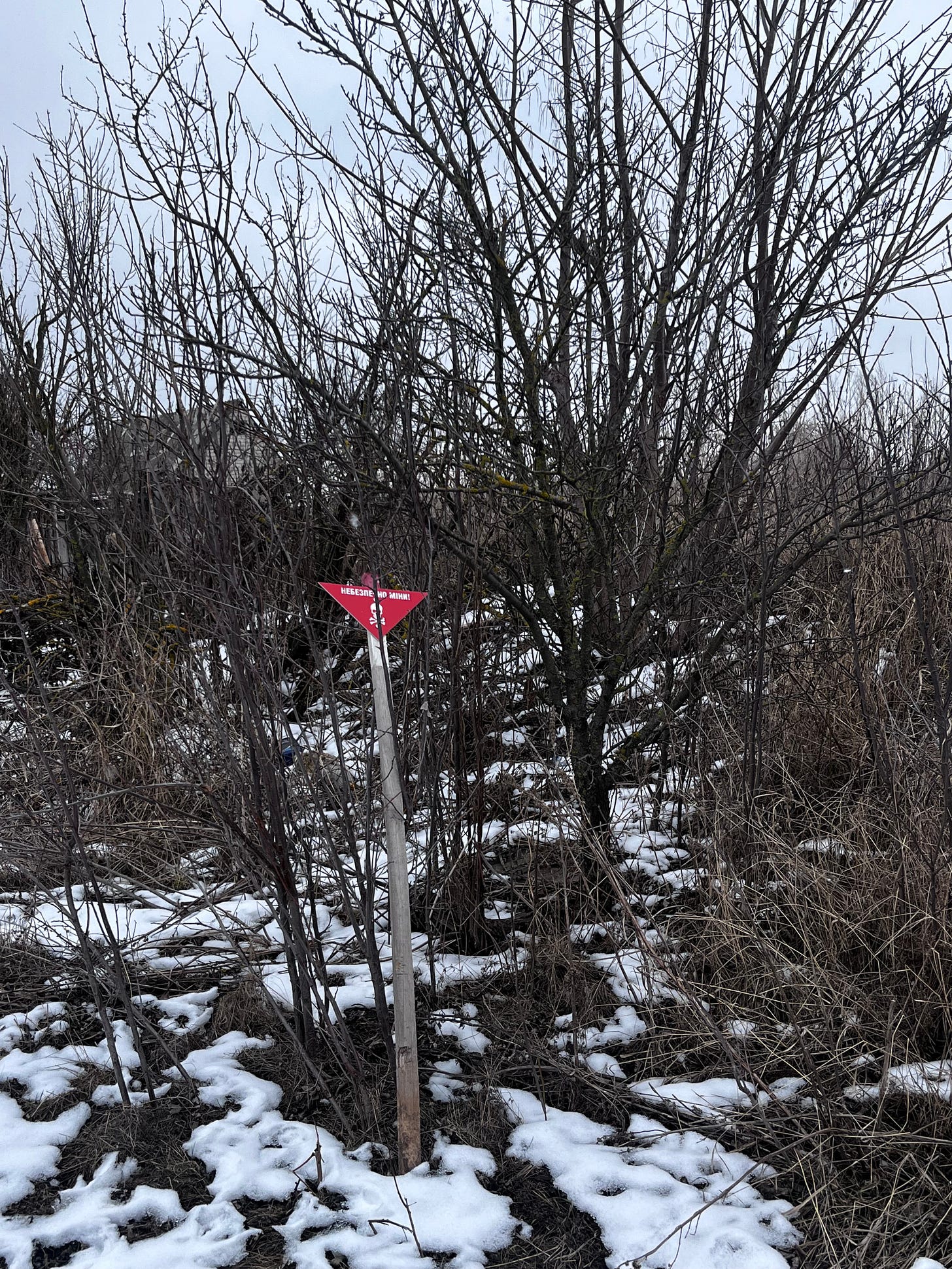Soviet war memorial. Kamyanka. March 2025. Own Photo.
Kamyanka, in Ukraine’s Kharkiv region, no longer exists in any meaningful sense. What stands in its place is a shell—rusted and dusted ruins, cratered soil, broken homes. Not one house was left undamaged during its Russian occupation in 2022.
At the centre of this wreckage stands a Soviet-era memorial to the Second World War: a stone soldier atop a platform of crumbling dates, “19__ – 1945.” The “41” has been chiselled off. Not in an act of vandalism or historical desecration but as a defence of historical truth —it’s a correction. For Ukraine, World War II began in 1939 with the Nazi invasion of the west of country (then part of the Polish Second Republic). In late September, western Ukraine was occupied by the Soviet Union under the terms of the Molotov Ribbentrop Pact. The Soviet ‘Great Patriotic War’, beginning in 1941, conveniently omits the part where the USSR helped start World War II.
This is not a local dispute over dates—it’s the front line of a broader conflict over history itself. Russia has turned its memory of the Second World War into a strategic doctrine. Since the early 2000s, the Kremlin has elevated the Great Patriotic War into the sacred core of state identity. It supplies moral legitimacy to foreign policy, domestic and transnational repression, torture. Victory in WWII is not just a story from the past—it’s a system of thought. One that defines Russia as perpetually righteous, perpetually besieged, and perpetually entitled to reshape the present through its version of the past.
Like all mythologies of the past, the Russian one is aggressively selective. As noted, it begins in 1941, omitting Stalin’s earlier alliance with Hitler. It casts “Russia” as the lone victor, who has the exclusive right to decide whether the millions of Ukrainians, Belarusians, Tatars, and others who fought and died should have that sacrifice recognised. And it ends in triumph, bypassing the mass desertions, gulags, forced deportations, and a reassertion of empire. It is history rendered in greyscale—except where its sharp edges can be weaponised.
Mine warning sign. Kamyanka. March 2025. Own photo.
The Immortal Regiment exemplifies this mobilisation. Originally a grassroots memorial march, it was co-opted by the state in 2015. Citizens march through streets—both in Russia and in Western cities—carrying portraits of WWII relatives, sometimes genuine, sometimes invented. The message is not remembrance but mobilisation. The dead are summoned into formation once again to lend legitimacy to the present. You marched with your grandfather in Berlin; now your children will do the same in Bakhmut. To question this is to betray your lineage.
Russia does not commit violence despite history, but through it. The occupation of Mariupol is likened to the liberation of Berlin. Filtration camps for civilians are rationalised as “denazification.” The mass graves and torture chambers of Izium and Olenivka are buried under the moral residue of 1945. Memory, in this system, is not an ethical act. It is a tool of impunity.
But Russia is not alone in its distortions. Western societies indulge in their own selective mythologies. Germany’s postwar identity rests on its confrontation with history, yet that confrontation has often privileged Russian suffering while sidelining Ukraine’s. The result? Strategic paralysis. Tanks delayed not out of pacifism but out of a hierarchy of remembered pain. Ukraine—ravaged under Nazi occupation—is treated as a footnote to a history Russia has successfully monopolised.
Britain and the U.S. lean on a different kind of myth: the idea of WWII as a moral war. One fought to save the Jews and defeat fascism. That version simplifies a far more complex reality—hesitant interventions, cynical diplomacy, closed borders to refugees, and geopolitical calculations that often (if not always) had little to do with moral clarity. These myths still shape policy. They offer a comforting lens through which to interpret new wars—especially ones we are reluctant to fight.
In both cases, memory flatters rather than instructs. It makes liberal societies poor students of history—drawn to analogy over analysis, commemoration over confrontation. It is easier to light candles for past victims than to reckon with the realities of new ones. Easier to speak of “never again” than to recognise “again” when it comes.
The blue tarpaulin of UNHCR. Kamyanka. February 2025. Own photo.
Kamyanka’s scarred monument tells a different story. Chiselling away “1941” is not about erasure. It is about asserting the right to one’s own past. To demand that history be honest, even when inconvenient. That is precisely what makes it dangerous—not to Ukrainians, but to the Russian identity that is so invested in controlling Ukraine and the Great Patriotic War.
Russia, for all its brutality, understands something that much of the West has forgotten: memory shapes ontology. It shapes how people see the world, what they believe they are owed, and what they are willing to sacrifice. Russia has an ontology. A bleak one, rooted in imperial grievance and historical exceptionalism—but it acts on it. It believes history justifies conquest, that borders are provisional, and that identity is to be imposed, not chosen.
Much of Western Europe, by contrast, mistakes its teleology for a strategy. Liberal democracy is still, inexplicably, presumed to be the endpoint of history—inevitable, universal, self-reinforcing - rather than a stale belief reinforced by political correctness. Some politicians still even speak of the “rules-based order” as if it were natural law, rather than a project requiring defence, discipline, and conviction. Rules do not enforce themselves. And history does not bend toward justice without pressure.
Liberalism is not a law of gravity. It is a choice. A fragile one. And right now, it is losing to systems that know exactly what they are.
In war, ontology beats optimism. Russia rewrites history because it knows where it wants the past to lead. Until we stop pretending we stand outside of history—and start recognising our own ontology—our ill-defined future will remain vulnerable to missiles and to the myths in which they are wrapped.






